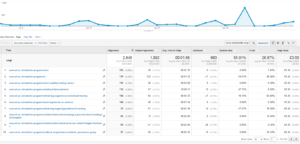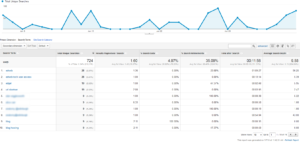Google Analytics insights
This summer I’ll begin a series of posts about Google Analytics, exploring some of the key reasons that we recommend its use. I will explore key tasks you can perform, and answer that vital question – “how can I tell if my site is successful”?
The University Website Programme provide guidance and support on tools that aid web editors analyse the performance of their site. These tools cover a range of user research, appraisal and monitoring tools – Google Analytics is only one of these.
Research and appraisal tools – Website Support wiki (EASE login required)
Why use google analytics?
Google Analytics helps us understand visitor interaction, with the ultimate goal of optimising sites so our target audiences can have successful visits.
Analytics can tell us many things about our sites and our visitors:
- Top content
- Top search terms
- Number of unique visitors
- Acquisition and exit routes
- Time on site
- Pages per visit
- When and where visits occur
Focussing on top pages (the ‘long neck’) – ensuring they’re helping your users complete your and their top tasks – will pay the greatest dividends. Working on the top ten pages in your site can easily cover 15-20% of all page views, so provides excellent return on time invested. It’s also important to know what your users cannot see on your pages, and are forced to search for.
Optimising what’s important – getting to know your long neck
You can discover what proportion of visitors are one-time or repeat visitors to your site. You can also see which pages they view, in what order, and how long they spend doing it. Are people coming to your site through search, links, from a marketing campaign – or somewhere else? Where are they going after reading your pages?
Whether the answers are expected or not, the key question is: are these interactions contributing to the success of our sites?
Measuring success – how long is a piece of string?
It’s only possible to measure whether a website is successful if the site has an agreed purpose and agreed target audiences. For example, what does it matter if 75% of your visitors have been to the site before, if you don’t know what the site is for, and who you are targeting with that information?
If success could be measured by simply loading web analytics and glancing at the number of people reading the pages, there would be no need for analysis (or analysts! – I for one am glad the machines haven’t yet taken over). So we need to put more thought into rational, evidence-driven ideas about site performance.
Neil Allison has posted about the University Website Programme’s services that can help think about your site’s strategy and define what success could look like for you.
How to get a grip of your website (and then keep hold)
An example strategy
On the EdWeb support pages we write, the aims of the site are to provide guidance, information and inspiration for University of Edinburgh staff on the use of EdWeb, with an aim to cut support calls as much as possible, so we can focus attention on more subjective editorial advice and analysis.
I primarily want to know:
- can our visitors navigate to the guides they need (is our navigation working)?
- do visitors spend appropriate time reading our guides (are they too short/long/detailed/written well)?
- when, where and how often do visitors give up and have to mail us?
I hope it doesn’t sound rude that the purpose of those pages is so that people don’t email us. We do want to talk to you, but we want to focus on strategy, analysis, and all those other things that go into making websites successful rather than explaining functionality of the system.
Target audiences
Our target audience is people who edit University pages using EdWeb. That’s an audience we’ve spent some time thinking about and defining.
Putting personas to work – defining target audiences
Without the information we collect on what people ask us, I wouldn’t know which topics our users are seeking greater/better support on. Teaming up the what of Google Analytics with the why of surveys, enquiry monitoring or usability testing will pay huge dividends.
Actionable insights
Where we identify pages that are not performing – based on the purpose of the site – we should seek to make changes to them. Some options to consider:
- should we copy edit the page?
- do surrounding pages need reordered?
- does the page need removed?
The University Website Programme provides training, support and advice on the use of Google Analytics, so if you’re having trouble with aspects of your strategy, please get in touch with us to start a discussion.



